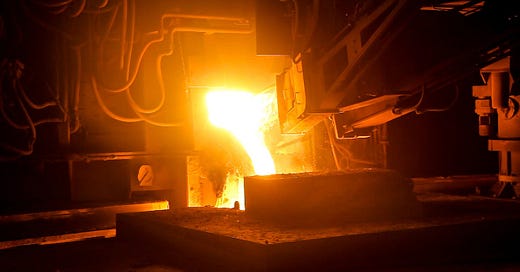Disclaimer: When I was younger (much younger!) I worked as a steel trader in London, buying and selling steel on the international market. The deals I managed included shipping steel from South Africa to Greece, from Belgium to Portugal and occasionally souring material from Argentina. It was one of my favourite jobs in a varied career. Although my knowledge of the steel business is decades out of date, I do have some insight to the industry.
British Steel, as a company, is not British owned, having been sold to xxx in xxx. It is British in name and location only.
The business is said to be losing £700,000 a day, some £255m a year. Not small change.
Its Chinese owners, Jingye, are threatening to close the blast furnaces at the plant in Scunthorpe, unless the British government bail them out to the tune of £1bn. An offer of half that, was declined by the Chinese owners.
According to reports British Steel could start to run down the furnaces from as early as this weekend, There is some evidence for these reports, as apparently the company has cancelled two shipments of coking coal from India, one of the required to run the blast furnaces. Without these materials, the furnaces cannot function and steel production would grind to a halt.
A blast furnace isn’t something which can turned on at on at will. Once the furnaces starts to cool, restarting it is almost impossible without a significant very expensive refurbishment over an extended period of time. In effect, once it stops, that is the end of the road.
Steel is an essential product in any country and used in anything from your car, to steel plates for shipbuilding, through to reinforcing bars and mesh for building construction. Domestic steel plants are the backbone of industry.
The Numbers
Four options appear to be available to British Steel:
Keep going and lose £700,000 a day. Not sustainable
Sell to another commercial owner. Few people will want to take on a lose making business at these levels of loss
Close it down and sack the employees. Not an attractive option.
Nationalise the company for £1 and have the government own and run the plant
To keep steel production going, the final option may be the only viable solution. That is, if you consider a loss of £700,000 a day viable.
Let’s do the math:
Loss: £700,000 a day, equals . . .
. . . a loss of £255,500,000 a year
The UK has a population of 69,000,000
Simple division, shows that the cost per head of population, is £3.70 a year
£3.70 is less than the £4.20 cup of coffee I am drinking in the cafe where I am writing this article
The Trump Factor
This week, has seen the imposition of a 25% tariff rate on steel and aluminium products imported into the United States. That makes any products from British Steel imported into the United States more expensive.
The most likely effect, is that US buyers will either purchase steel domestically, or look for cheaper foreign sources to save them money. The result, would be fewer orders from the US to British Steel.
That complicates the equation, although the way that Donald Trump has imposed these tariffs, the UK is not in a unique position.
The Call for Nationalisation
Could the £3.70 per head of population be the only solution to keep British Steel afloat?
Nationalisation of a commercial company used to be the mantra of previous Labour governments. That course is not as popular today, although the railways are effectively being nationalised at the moment.
The government has to weigh up the options of unemployment in Scunthorpe, against the loss of domestic steel production, an essential industry.
What decision will be taken is unknown at this point, but with the lack of raw materials on route to the UK and with the Chinese wanting to walk away or close the blast furnaces this week - the government may have little choice.




I used to commute from Sheffield to Rotherham, where I saw the damage from coal and steel closings. Not pretty. Whole towns can be devastated as the laid-off workers have little money to spend (I was working in social security so I saw how many families were affected).
There is also the cost to the government of unemployment benefits for these workers and their families to take into account. What would be the net cost per job or per Brit after taking that into account?
Steel and coal are not entirely fungible - there are different types for different purposes, so it may not be as easy as you'd think to find alternative markets, perhaps supplying those who used to import from the USA, but I hope the government will try.
As you point out, they have to be quick to keep the furnaces going. If the plants had been making a loss for so long, I wonder why they had to act so quickly to cancel the coke. Utter despair? Or hoping to force the government's hand for a subsidy? Certainly nationalisation would be a better investment for the government. The owners would no doubt keep coming back for more.
£3.70 sounds affordable, but what if there are many other industries and corporations that need bailing out? I would not want to be in Starmer's position right now.